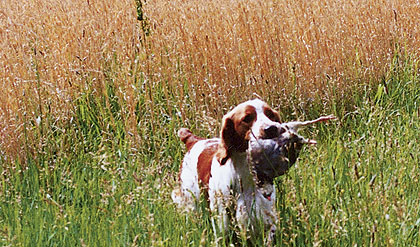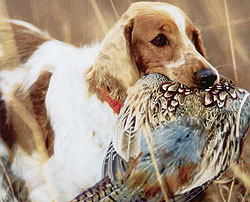At A Glance, The Welsh Springer Spaniel May Look Like A Brittany, But The Welshie Is Definitely Its Own Dog
By M.J. Nelson
Not many sporting breeds suffer from the kind of identity crisis that affects the Welsh springer spaniel. Indeed, long-suffering Welshie owners are constantly, patiently explaining to their fellow hunters that no, it's not a Brittany; it's a Welsh springer spaniel.
 Ch. Rolyart's Going My Way SH WD ("Zoey"), a Welsh springer spaniel owned by Cindy Ford and Shelley Traylor, does some chukkar work. |
In defense of the identity-challenged hunters, however, it's an honest error. Both breeds are medium-sized sporting dogs. The Welshie is red and white and Brits come in orange (a derivative of red) and white. Even though the American Brittany Club has removed the designation "spaniel" from the Brittany's name, both breeds have a "spanielesque" look to them.
Another reason for the Welsh springer's frequently mistaken identification as a Brit is because the WSS is rarely seen in the field. Only 310 were registered with the American Kennel Club in 2004, while in the same year more than 8,000 Brittanys were registered. So, although it dismays their owners, there's a reason why so many hunters, when observing a WSS in the field, say "Nice Brit!" to the Welshie's hunting partners.
Welsh Springer Ancestry
It is also likely that the Welsh springer and the Brittany originate from a common ancestor--a white hunting dog with red markings brought to Wales by the Gauls in about 250 BC. But on the Continent, the Bretons wanted a dog that gave them considerable warning before it flushed the bird. As a consequence, they began to selectively breed for dogs that stopped and waited for the hunter to get into position instead of charging in on the scent and putting the birds to flight. To the blue-collar hunters in Wales, this was roughly the equivalent of making sure you wore the proper colored ascot with your smoking jacket.
The isolation of Wales was well suited for the Welsh springer to develop as a separate breed. A red and white spaniel did appear in 16th century paintings and it is believed that because of color, conformation and carriage, these were paintings of what became the modern Welsh springer. But the breed's isolation in Wales also gave English springer spaniels a lengthy head start as a popular gun dog long before anyone other than the Welshmen knew of the existence of the Welsh springer.
Hunting The WSS
Randy Capsel, who owns Welshies along with English springers and golden retrievers, said the Welsh springer is a good alternative to other flushing breeds. "I have had a number of owners of field-bred English springers tell me that the dogs had too much 'power' or were too difficult to handle. The Welsh springer is similar in size and ability to the English springer but they are usually a more methodical working dog and do not move with the same kind of speed. For a hunter who doesn't want an overpowering dog and who does want a dog that works at a reasonable pace without giving up the advantage of a medium-sized dog, the Welsh springer is a very good choice.
"The Welsh springer does not have the same flushing style as the English springer. While there are always exceptions, the majority of Welsh springers, once they acquire the bird's scent, will work the trail diligently, alternating between air and ground scenting. Once close to the bird and many times just before the flush, a Welsh springer will hesitate, pausing briefly. This brief pause is normally followed by a hard drive toward the bird to complete the flush.
"They're also decent duck hunting dogs in the early and mid-season but they don't have the coat for late-season duck hunting. Goose hunting is another matter. For the most part, geese are too large for a Welsh springer to handle. They are very intelligent and once trained they retain the knowledge well."
Cindy Ford and Shelley Traylor own a Welsh springer that, they say, demanded they hunt with her. "She had so much natural instinct that there was nothing else to do but hunt with her," said Ford. "But I would not recommend this breed to hunters who do not want to take the time to train the dog themselves. Welsh springers usually only work well for their special person. They are not the type that will go out with a group of people and work for everyone. They are very devoted to the people they believe they own, in other words, the person who trains them. They do not do well in an environment such as would occur if they were sent to a professional trainer and put in a kennel."
Trainability
Susan Riese, who with her husband breeds Statesman Welsh springers, said that this is a breed that must have a job or they will get in trouble. "They love to train but it can't be repetitive or they get bored. It has been my experience that the 'hunt' is so deeply embedded in the breed that it is more important to raise a Welsh correctly so that it is successful in the field rather than breeding for it. Fortunately this is a breed that has not developed a split between 'show' and 'field' types. However, there are a few breeders who claim their dogs are hunting dogs but they do not participate in any hunting events to provide proof of their dogs' abilities. As a group, they do not seem to be very concerned about type, health or structure. It is my hope these few breeders will not have any significant impact on the breed."
Randy Capsel added that when training a Welsh springer, it is important to bear in mind that they typically mature more slowly than do English springers or cocker spaniels. While the Welsh enjoys training and working even as a young dog, owners and trainers need to keep in mind that a Welsh springer may lag a few months behind what would be expected of a year-old springer or cocker. "Training has to be adjusted to work with their slower maturing nature. They can handle corrections in training as long as they thoroughly understand what you want them to do and know why they're being corrected. But an overly harsh correction will frequently cause them to shut down for a time as they begin to think too much.
"If you correct them for doing something wrong and they don't completely understand why they're being corrected, they become confused and require a longer time to bounce back than, say, an English springer. They seem to be a thinking dog that once they understand what is expected, may try to do a task their own way. Typically, this is not done as disobedience but rather just attempting to accomplish the task more efficiently."
 According to Susan Riese, the Welsh springer spaniel is a breed that needs a job. Ch. Rwyn Heavens Alliant SH ("Glory"), one of the Rieses' Welsh springers, does her favorite job, retrieving pheasants. |
As is the case with many medium-sized and large breeds, the Welsh springer has problems with hip dysplasia so it is important to make certain both parents have the appropriate hip certifications either from the Orthopedic Foundations for Animals (OFA) or PennHip numbers.
Of much greater concern to Welsh breeders and owners, however, is the problem of seizures (epilepsy). While most Welsh springers are not afflicted with this nervous system disorder, the incidence is high enough among certain bloodlines in the breed to warrant concern among breeders. This concern was great enough for the Welsh Springer Spaniel Club of America to help fund a study by Dr. Gary Johnson at the University of Missouri into the genetic mutation(s) responsible for inherited canine epilepsy in the hope that his work will result in the ability to identify an "epilepsy gene" in the breed, which would mean that carriers of this gene could be identified with a simple blood or cheek swab test.
As is always the case with rare breeds, finding a Welsh springer spaniel pup can be a daunting task. However, the Welsh Springer Spaniel Club of America has a breeder referral on its Web site (www.wssca.com), which lists breeders in various regions of the country who are in good standing with the club and have been for at least two years. Be advised, however, that you may have a considerable wait. While that can be discouraging, it is important to view the wait in a proper light. It is a positive sign that Welsh springer breeders are not producing pups on a casual whim.
As always, before you buy a pup, make sure that the sire and dam have the appropriate health clearances, the breeder offers a written guarantee that provides for a refund of the purchase price in the event the pup develops genetic health problems and the breeder has a standing offer to take the pup back in the event the owners cannot or will not take proper care of it.
Most good breeders incorporate these items in a written contract that frequently includes restrictions on when or if the pup will be allowed to reproduce. Many breeders make use of the AKC's limited registration program to ensure that dogs from their breeding have met certain requirements before the full registration, which permits the resulting offspring from the dogs to be registered, is granted.
If you are patient and persistent, you will eventually be rewarded with a Welsh Springer and these WSS fanciers agree that it is well worth the wait. "They are great dogs, fun to hunt with and they are also pleasant to have around the house," said Randy Capsel. "What more can you ask?"






